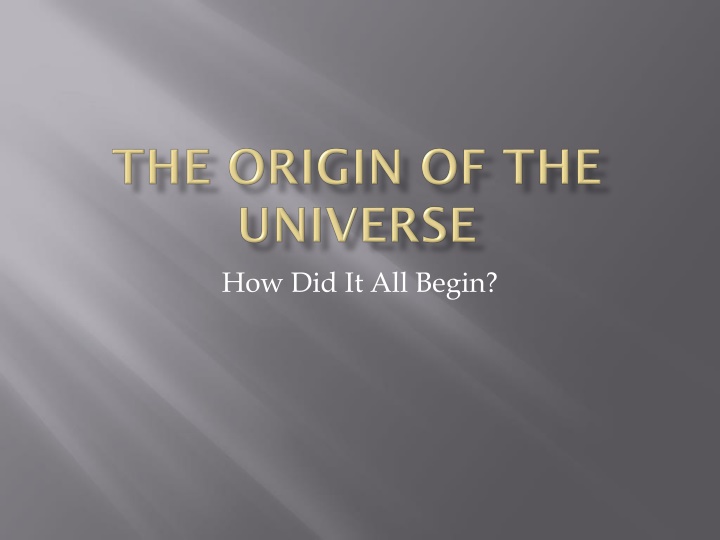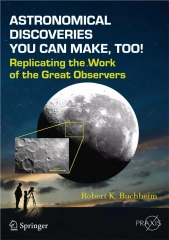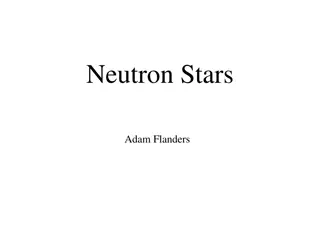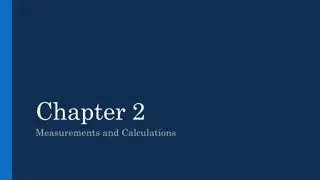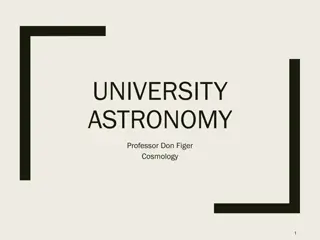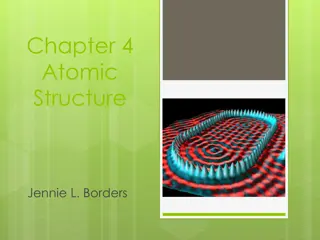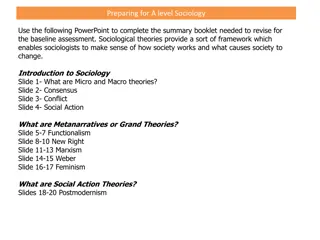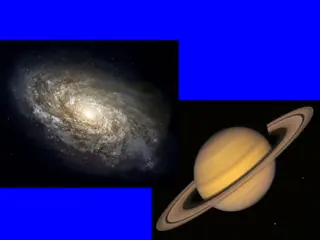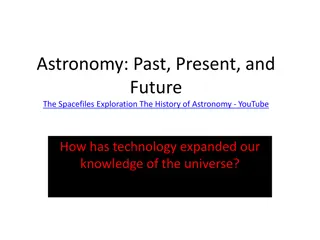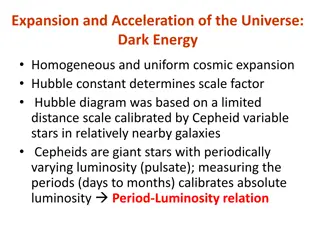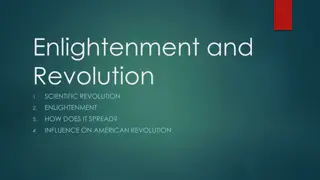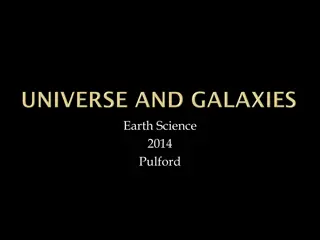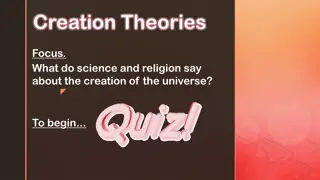The Origin of the Universe: A Journey Through Scientific Theories and Discoveries
The concept of the universe's beginning has evolved over time, with early beliefs in its eternal nature shifting to the acknowledgment of a starting point. Pioneering scientists like Albert Einstein and Sir Fred Hoyle contributed to this transformative understanding, challenging traditional views. Einstein's theory of relativity in 1916 indicated a universe with a definite origin, leading to a deeper exploration of the cosmos. The shift to acknowledging a beginning impacted scientific and philosophical perspectives, highlighting the complexities of existence and divinity.
Download Presentation

Please find below an Image/Link to download the presentation.
The content on the website is provided AS IS for your information and personal use only. It may not be sold, licensed, or shared on other websites without obtaining consent from the author.If you encounter any issues during the download, it is possible that the publisher has removed the file from their server.
You are allowed to download the files provided on this website for personal or commercial use, subject to the condition that they are used lawfully. All files are the property of their respective owners.
The content on the website is provided AS IS for your information and personal use only. It may not be sold, licensed, or shared on other websites without obtaining consent from the author.
E N D
Presentation Transcript
The universe has no beginning and no endit was believed at this time that the universe was eternal. Many famous scientists of that day held strongly to this theory: Albert Einstein and Sir Fred Hoyle (who revised the theory in 1948).
http://www.exopoliticsgb.com/sites/default/files/field/image/FredHoyle_Chandra_Wrickramasinghe_0.jpghttp://www.exopoliticsgb.com/sites/default/files/field/image/FredHoyle_Chandra_Wrickramasinghe_0.jpg
https://encrypted-tbn0.gstatic.com/images?q=tbn:ANd9GcQ51MhFTkU60QQC_ICn5HOzArdJ5XTqbuHi1C_Eil29GmgNE4ka2Qhttps://encrypted-tbn0.gstatic.com/images?q=tbn:ANd9GcQ51MhFTkU60QQC_ICn5HOzArdJ5XTqbuHi1C_Eil29GmgNE4ka2Q
In 1916 Einsteins theory of relativity indicated that the universe had a beginning! http://25.media.tumblr.com/938ebaea01dc77638faa08482779dec6/tumblr_mjo1xa0Haw1r5j2gro1_1280.jpg
Pantheism is the belief that the universe (or nature as the totality of everything) is identical with divinity, or that everything composes an all-encompassing, immanent god. Pantheists thus do not believe in a distinct personal or anthropomorphic god. In other words the universe is god. This explains why he was uncomfortable with his own theory being true.
Revealed that matter, time, and energy had a beginning. Einstein called his discovery irritating. He wanted the universe to be self- existent not reliant on an outside cause. Einstein introduced a fudge factor into his own equation!
http://blog.oup.com/wp-content/uploads/2014/01/1926-eddington-sq.jpghttp://blog.oup.com/wp-content/uploads/2014/01/1926-eddington-sq.jpg
http://www.sciencebuzz.org/sites/default/files/images/1919_eclipse_neg_pos.jpghttp://www.sciencebuzz.org/sites/default/files/images/1919_eclipse_neg_pos.jpg
Philosophically, the notion of a beginning of the present order of nature is repugnant to me I should like to find a genuine loophole.
1922: Russian mathematician Alexander Friedmann exposed Einstein s fudge factor as an algebraic error Einstein in order to avoid a beginning divided by zero! Einstein later described this error as the greatest blunder of my life.
Dutch astronomer Willem de Sitter found that Einstein s general relativity required an expanding universe. This expanding universe was verified in 1927 by Edwin Hubble (namesake of space telescope).
The red shift in the light from every observable galaxy means those galaxies are moving away from us. The universe appears to be expanding from a single point in the past. Einstein s theory of relativity is strong evidence that the universe had a beginning and is NOT eternal.
https://encrypted-tbn0.gstatic.com/images?q=tbn:ANd9GcS2B3qPmQkE2EJjUiaWZBtK-XXWb8Sf4MNe3QynQqDHVvrkrhft9c-c7bOLhttps://encrypted-tbn0.gstatic.com/images?q=tbn:ANd9GcS2B3qPmQkE2EJjUiaWZBtK-XXWb8Sf4MNe3QynQqDHVvrkrhft9c-c7bOL
Over time things tend toward entropy or randomness. Over time the universe will run out of useful energy. This is called the heat death of the universe. So, if the universe is winding down, there must have been a time when it was wound up.
It is predicted that if there was a beginning to the universe, there should be background radiation left over from the initial event.
Sir Fred Hoyle in disgust coins the term Big Bang. Hoyle found the idea of a universe with a beginning unacceptable. Hoyle went to his death refusing to accept it despite the overwhelming evidence for it.
http://media.web.britannica.com/eb-media/83/19183-004-033404B4.jpghttp://media.web.britannica.com/eb-media/83/19183-004-033404B4.jpg
Everything that had a beginning had a cause The universe had a beginning Therefore the universe had a cause 1. 2. 3.
THE fundamental principle of science! Without it, science is impossible. Sir Francis Bacon (father of modern science): True knowledge is knowledge of causes.
Everything that had a beginning had a cause The universe had a beginning Therefore the universe had a cause 1. 2. 3.
Many in the scientific community continue to try to find ways to explain the universe appearing without a cause. This flies in the face of empirical data, common sense, and true science.
If scientists like Hoyle and Einstein could believe that matter and energy could be eternal, why could they not believe that an intellect could also be eternal?
Either NOTHING created something from nothing, or SOMETHING created something from nothing. Which makes more sense?
